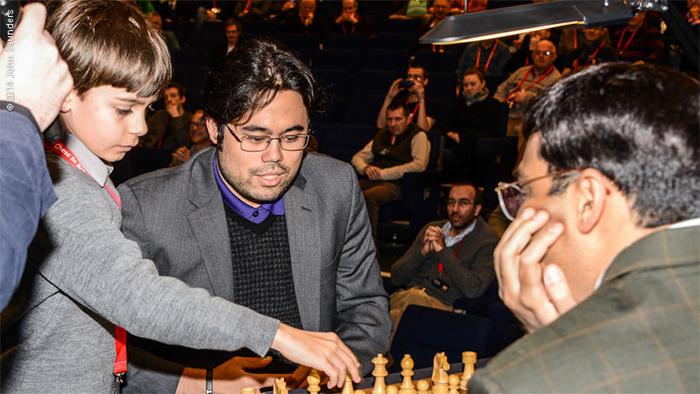
3 Draws In 3rd Round London Chess Classic
All three games in the third round of the London Chess Classic ended in draws, and so GMs Anish Giri and Vladimir Kramnik continue to share the lead.
Round four will be played on Saturday starting two hours earlier, at 2 p.m. GMT.
Photo © John Saunders.
Friday was Berlin Day in London. Two-thirds of the games saw a Berlinending (but that's not saying much with just three games in total). Whereas almost all top players have this opening in their repertoire, the chess fans are not exactly jumping out of their seats.
Luckily, they were treated with a rare, romantic opening too: the Evans Gambit! Where he had played the King's Gambit in an earlier edition of the London Chess Classic, Hikaru Nakamura went for that other 19th-century opening this time against Vishy Anand.

It's always interesting to see how a top GM handles a gambit, and with Anand there was more to it. When Garry Kasparov played the Evans a few times in the mid-90s, the Indian was in fact one of his victims. (Jeroen Piket also lost, Nigel Short held a draw.)
Nineteen years ago in Riga, Anand responded with the 5...Be7 6.d4 Na5 line, but went down in just 25 moves. This time he chose one of the most reliable systems these days: 5...Ba5 and 7...Qd7. He reached a very comfortable position out of the opening, then allowed a small White initiative but before the time control the players repeated moves.
Here's the game, annotated by GM Dejan Bojkov:

That leaves us with the two Berlin games. And before you click away this report: one of those was really interesting!
That wasn't Giri-Caruana, which ended in a draw without much of a fight. There was one remarkable moment, though, on move 12.
Here Giri played a truly mysterious rook move (one of Aron Nimzowitsch's famous chess terms): 12...Rc8!? and when Nigel Short was asked about it, he simply couldn't explain it.
At the press conference Giri made an attempt to explain (it's mostly prophylaxis against Ne2-f4-d5 or Bc1-f4 hitting c7), and at some point he mentioned that for Black it's “hard to connect the rooks.” This prompted Short to ask him: “If it's hard to connect the rooks, why do you play the Berlin?”
Giri thought for a bit, and replied: “If Black were to castle short he would have minus plus in all the theoretical Berlin positions. You can't have it all.” (To round things off, the young Dutchman then suggested another mysterious rook move (albeit more Berlinesque) in the diagram position: 12...Rg8!)

In the game below you'll find a few variations from the players.

To the question why everyone plays the Berlin these days, Giri gave an interesting answer: “Generally at top level people try to neutralize the black color, get a theoretical equality. There are few people who are capable of working very hard. Basically Kramnik is working the hardest, I guess, and the most efficient. Since he decided he'll play Berlin, that's what we all play!”
Later in the evening, Kramnik himself defended his opening semi-jokingly: “It's a very interesting endgame in fact. Maybe I'm a pervert, but for me it's not boring at all!”
The Russian GM had spent more than an hour on four moves just before the time control, when a very complicated rook ending had appeared on the board. Somehow he lost track in all the variations, and while playing for a win, he missed one detail and got into trouble. In fact, Adams was winning for one move — the infamous 40th move.

“I was going to play this f6+ first but OK, it was the 40th move and I didn't have so much time. Five minutes is enough to think, but sometimes you don't make the right move at the right moment. If I would have had no time I would have played f6,” said Adams.
Kramnik added: “If I would have only 10 minutes at the start of this rook ending I wouldn't get lost. Sometimes time works against you.”
Don't forget that round four will be played on Saturday starting two hours earlier, at 2 p.m. GMT.
2014 London Chess Classic | Round 3 Standings
| # | Name | Rtg | 1 | 2 | 3 | 4 | 5 | 6 | Score | Perf |
| 1 | Giri, Anish | 2768 |  |
3 | 1 | 1 | 5 | 2903 | ||
| 2 | Kramnik, Vladimir | 2769 |  |
1 | 1 | 3 | 5 | 2891 | ||
| 3 | Adams, Michael | 2745 | 0 | 1 |  |
3 | 4 | 2788 | ||
| 4 | Anand, Viswanathan | 2793 | 1 |  |
1 | 1 | 3 | 2791 | ||
| 5 | Nakamura, Hikaru | 2775 | 1 | 0 | 1 |  |
2 | 2657 | ||
| 6 | Caruana, Fabiano | 2829 | 1 | 0 | 1 |  |
2 | 2649 |
Previous reports
- Round 2: London R2: Adams Loses To Giri, Kramnik Crushes Nakamura
- Round 1: London R1: Adams Beats Caruana in Rollercoaster Game
- Blitz: London Classic Blitz: Adams Wins On Tiebreak
- Rapid: “Stonking Performance” For Nakamura At London's Super Rapidplay Open
- Preview: London Chess Classic Kicks Off Tomorrow


